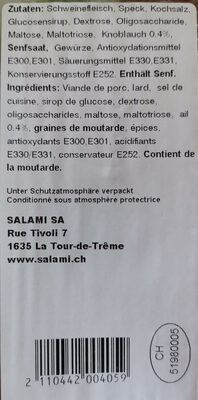Lyoba Saucisse à l'ail barquette - Saveur de Gruyère - 81 g
This product page is not complete. You can help to complete it by editing it and adding more data from the photos we have, or by taking more photos using the app for Android or iPhone/iPad. Thank you!
×
Barcode: 2110442004059 (EAN / EAN-13)
Quantity: 81 g
Brands: Saveur de Gruyère
Categories: Meats and their products, Meats, Prepared meats, Cured sausages, Garlic sausage
Labels, certifications, awards: Made in Swiss
Origin of ingredients: Switzerland
Manufacturing or processing places: Suisse
Traceability code: CH-51980005
Stores: Coop
Countries where sold: Switzerland
Matching with your preferences
Environment
Carbon footprint
Packaging
Transportation
Report a problem
Data sources
Product added on by openfoodfacts-contributors
Last edit of product page on by roboto-app.
If the data is incomplete or incorrect, you can complete or correct it by editing this page.






